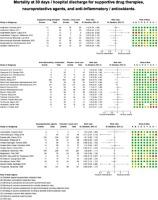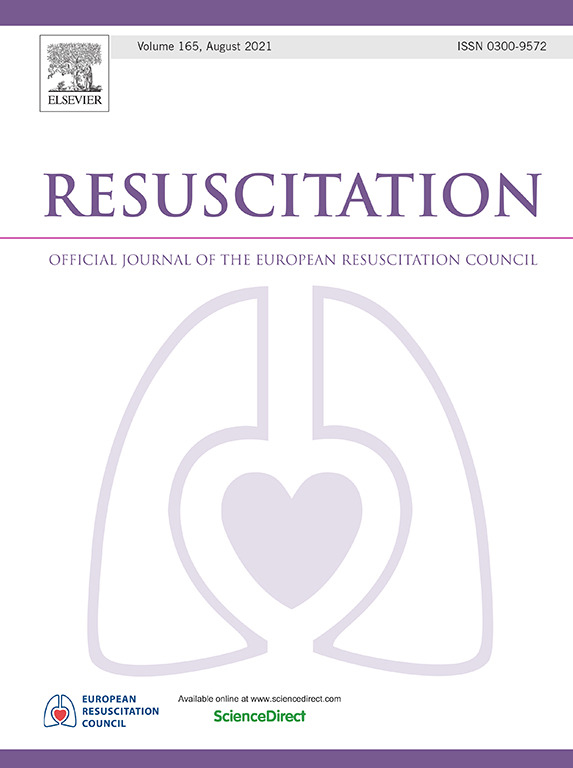Drug therapy versus placebo or usual care for comatose survivors of cardiac arrest; a systematic review with meta-analysis
IF 6.5
1区 医学
Q1 CRITICAL CARE MEDICINE
引用次数: 0
Abstract
Background
In Europe, approximately 291,000 cardiac arrests occur annually. Despite critical care therapy, hospital mortality remains high. This systematic review assessed whether, in comatose survivors of cardiac arrest, any drug therapy, compared to placebo or usual care, improves outcomes.
Methods
We searched Medline, EMBASE, the Cochrane Central Register of Controlled Trials, and The International Clinical Trials Registry Platform for randomized controlled trials of drug therapy in comatose survivors of cardiac arrest (last searched 20th October 2024). The primary outcome was mortality at 30 days/hospital discharge. Other outcomes reflected those of the Core Outcome Set for Cardiac Arrest. Risk of bias was assessed using Cochrane Risk-Of-Bias Version 1. Studies of steroids, coenzyme Q10 and thiamine were meta-analysed.
Results
From 2562 records, 207 full texts were screened and 45 studies (5800 patients) investigating 30 therapies were included. Studies were grouped thematically as supportive drug therapies (n = 10), neuroprotective agents (n = 19), and anti-inflammatory/antioxidants (n = 16). Four studies reported reduced mortality at 30 days/hospital discharge: one of the anticholinergic penehyclidine hydrochloride, two of intra-arrest vasopressin and methylprednisolone plus hydrocortisone for post resuscitation shock, and one of the traditional Chinese medicine, shenfu.
Studies of steroids, coenzyme Q10 and thiamine were meta-analysed. We could not detect an effect on mortality with steroids (n = 739, risk ratio (RR), 0.93; 95 % CI 0.83–1.04, p = 0.21; I2 = 60 %, low certainty), coenzyme Q10 (n = 107, RR, 0.91; 95 % CI 0.61–1.37, p = 0.65; I2 = 0 %, low certainty), or thiamine (n = 149, RR, 1.11; 95 % CI 0.88–1.40, p = 0.39; I2 = 0 %, very low certainty).
Conclusion
In comatose survivors of cardiac arrest, the majority of trials of drug therapy reported no effect on mortality. Meta-analyses of steroids, coenzyme Q10 and thiamine demonstrated no evidence of an effect on mortality. However, the low certainty of evidence warrants further research.

针对心脏骤停昏迷幸存者的药物治疗与安慰剂或常规护理的比较;系统综述与荟萃分析。
背景:在欧洲,每年约有 291,000 例心脏骤停。尽管进行了重症监护治疗,但住院死亡率仍然很高。本系统综述评估了与安慰剂或常规护理相比,任何药物疗法是否都能改善心脏骤停昏迷幸存者的预后:我们检索了 Medline、EMBASE、Cochrane Central Register of Controlled Trials 和 The International Clinical Trials Registry Platform,以了解针对心脏骤停昏迷幸存者的药物治疗随机对照试验(最后检索日期为 2024 年 10 月 20 日)。主要结果为出院 30 天后的死亡率。其他结果反映了心脏骤停核心结果集的结果。偏倚风险采用 Cochrane Risk-Of-Bias Version 1 进行评估。对有关类固醇、辅酶Q10和硫胺素的研究进行了荟萃分析:从 2,562 份记录中筛选出 207 篇全文,共纳入 45 项研究(5,800 名患者),调查了 30 种疗法。研究按主题分为支持性药物疗法(10 项)、神经保护剂(19 项)和抗炎/抗氧化剂(16 项)。有四项研究报告了 30 天/出院时死亡率的降低情况:一项研究使用了抗胆碱能药物盐酸哌尼环己烷,两项研究使用了用于复苏后休克的复苏中血管加压素和甲基强的松龙加氢化可的松,还有一项研究使用了传统中药神曲。对有关类固醇、辅酶 Q10 和硫胺素的研究进行了荟萃分析。我们未能发现类固醇(n = 739,风险比(RR),0.93;95 % CI 0.83-1.04,p = 0.21;I2 = 60 %,低确定性)、辅酶 Q10(n = 107,RR,0.91; 95 % CI 0.61-1.37, p = 0.65; I2 = 0 %, 低确定性)或硫胺素(n = 149, RR, 1.11; 95 % CI 0.88-1.40, p = 0.39; I2 = 0 %, 极低确定性):结论:对于心脏骤停的昏迷幸存者,大多数药物治疗试验报告称对死亡率没有影响。类固醇、辅酶 Q10 和硫胺素的 Meta 分析表明,没有证据表明它们对死亡率有影响。然而,由于证据的确定性较低,因此需要进一步研究。
本文章由计算机程序翻译,如有差异,请以英文原文为准。
求助全文
约1分钟内获得全文
求助全文
来源期刊

Resuscitation
医学-急救医学
CiteScore
12.00
自引率
18.50%
发文量
556
审稿时长
21 days
期刊介绍:
Resuscitation is a monthly international and interdisciplinary medical journal. The papers published deal with the aetiology, pathophysiology and prevention of cardiac arrest, resuscitation training, clinical resuscitation, and experimental resuscitation research, although papers relating to animal studies will be published only if they are of exceptional interest and related directly to clinical cardiopulmonary resuscitation. Papers relating to trauma are published occasionally but the majority of these concern traumatic cardiac arrest.
 求助内容:
求助内容: 应助结果提醒方式:
应助结果提醒方式:


